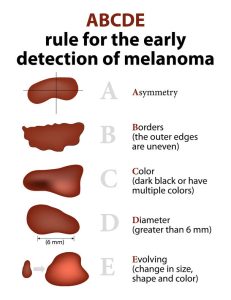
The U.S. Preventive Services Task Force (USPSTF) recommendation statement on screening for skin cancer concluded that evidence was insufficient to balance the benefits and harms of screening, and thus it did not recommend for or against screening.
No randomized trials are available to address whether screening improves important clinical outcomes in melanoma.
In a screened population study of 145,000 patients the age- and sex-adjusted incidence of in situ melanoma was higher in screened than in unscreened patients (30 vs. 14 per 100,000 person-years); the same was true for thin invasive melanomas (24 vs. 16 per 100,000 person-years).
In contrast, the incidence of thick melanomas (>1 mm thickness) was not significantly different in the two groups.
The identification and excision of these early melanomas is not destined to reduce death or morbidity.
Overdiagnosis is a major problem.
Routine screening is not justified in the absence of high-quality evidence showing that benefits clearly outweigh harms.
Nontargeted skin checks may bring little value to and may harm patients.
Others maintain that the harms from overdiagnosis of melanoma are minimal compared with the more-invasive downstream interventions associated with breast and prostate cancer screening.
